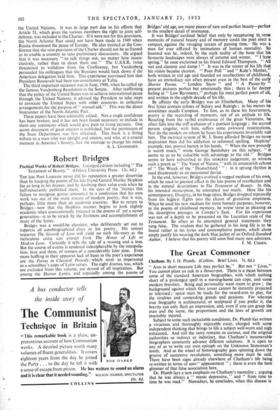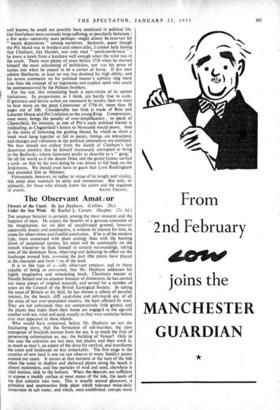The Great Commoner
" AND in short measure Life may perfect be." But not " Lives." You cannot plant an oak in a flower-pot. There is a mean between some of the standard American biographies, with which nothing short of a prolonged spell in a nursing-home can cope, and some modern brevities. Being and personality want room to grow ; the background against which they tower cannot be instantly projected or televised ; space must be made for the sword-arm to play, -for the rivalries and contending greeds and passions. For whereas true biography is architectural, or sculptural if you prefer it, the brevity can only flash an impression, and, even if you can grasp the man and the scene, the proportions and the laws of growth are insensibly injured.
Subject to some such ineluctable conditions, Dr. Plumb has written a vivacious and thoroughly enjoyable essay, charged with some independent thinking that brings to life a subject well-worn and nigh exhausted. And still the story remains so curious, and the original authorities so indirect or indistinct, that Chatham's innumerable biographers constantly advance different solutions. It is open to any of us to write our own epitaph on the Unknown Statesman's tomb. And as the wheel of historiography goes spinning down the groove of successive revolutions, something more must be said. There have been signs already elsewhere of Chatham's life being re-written in terms of anti-" appeasement " ; there is even the bare glimmer ,a that false association here.
Dr. Plumb lays a new emphasis on Chatham's mentality ; arguing that he was always a " manic depressive," and " from time to time he was mad." Nowadays, he concludes, when this disease is well known, he could not possibly have continued in political life. Our forefathers were curiously long-suffering, or peculiarly fortunate ; a few seats—university seats perhaps—might almost be reserved for "manic depressives" among ourselves. Seriously, queer though the Pitt blood was in brothers and sisters alike, I cannot help feeling that Chatham, like Hamlet, was only mad " north-north-west " ; he knew a hawk from a handsaw well enough when the wind was in the south. There were plenty of years before 1758 when he showed himself the most calculating of politicians, nor was his sense of tactics lost when he ceased to be a cornet of horse. If few men admire Shelburne, at least no one has doubted his high ability, and his severe comments on his political master's subtlety ring more true than the concept of an ingenuous and exalted spirit who could be outmanoeuvred by the Pelham brothers.
For the rest, this stimulating book is part-victim of its spatial limitations. Its proportions, as I think, are hardly true to scale. If greatness and heroic action are measured by results, then we want to hear more on the great Commoner of 1754-61, more than 38 pages out of 160. Considerably too little is made of Bute and Leicester House and Pitt's relation to the young King. Compression, once more, brings the penalty of over-simplification ; to speak of Chesterfield, for instance, as one of Pitt's early political friends is misleading, as Chagerfield's letters to Newcastle would prove. And in the stress of following the guiding thread, by which so short a • book must hang together or fall to pieces, timings are telescoped, and changes and vibrations in the political atmosphere are confused. We thus should not collect from the sketch of Chatham's last clisnstrous ministry that he himself strenuously attempted to bring in the Etedfords—whom historians prefer to describe as a "gang," for all the world as if the decent Duke and the genial Gower carried a cosh—or that by his own doing he was driven to fall back on the Jenkinsons. We should even have to guess that Lord Rockingham had preceded him as Minister.
Fortunately, however, or rather in virtue of its insight and vitality, this essay does maintain its unity and momentum. But only, or primarily, for those who already know the actors and the sequence



































 Previous page
Previous page